|
|
|
Sort Order |
|
|
|
Items / Page
|
|
|
|
|
|
|
| Srl | Item |
| 1 |
ID:
181560
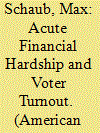

|
|
|
|
|
| Summary/Abstract |
How does poverty influence political participation? This question has interested political scientists since the early days of the discipline, but providing a definitive answer has proved difficult. This article focuses on one central aspect of poverty—the experience of acute financial hardship, lasting a few days at a time. Drawing on classic models of political engagement and novel theoretical insights, I argue that by inducing stress, social isolation, and feelings of alienation, acute financial hardship has immediate negative effects on political participation. Inference relies on a natural experiment afforded by the sequence of bank working days that causes short-term financial difficulties for the poor. Using data from three million individuals, personal interviews, and 1,100 elections in Germany, I demonstrate that acute financial hardship reduces both turnout intentions and actual turnout. The results imply that the financial status of the poor on election day can have important consequences for their political representation.
|
|
|
|
|
|
|
|
|
|
|
|
|
|
|
|
| 2 |
ID:
146103
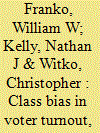

|
|
|
|
|
| Summary/Abstract |
The mass franchise led to more responsive government and a more equitable distribution of resources in the United States and other democracies. Recently in America, however, voter participation has been low and increasingly biased toward the wealthy. We investigate whether this electoral “class bias” shapes government ideology, the substance of economic policy, and distributional outcomes, thereby shedding light on both the old question of whether who votes matters and the newer question of how politics has contributed to growing income inequality. Because both lower and upper income groups try to use their resources to mobilize their supporters and demobilize their opponents, we argue that variation in class bias in turnout is a good indicator of the balance of power between upper and lower income groups. And because lower income voters favor more liberal governments and economic policies we expect that less class bias will be associated with these outcomes and a more equal income distribution. Our analysis of data from the U.S. states confirms that class bias matters for these outcomes.
|
|
|
|
|
|
|
|
|
|
|
|
|
|
|
|
| 3 |
ID:
156696
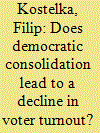

|
|
|
|
|
| Summary/Abstract |
This article challenges the conventional wisdom that democratic consolidation depresses voter turnout. Studying democratic legislative elections held worldwide between 1939 and 2015, it explains why voting rates in new democracies decrease when they do, how much they decrease, and how this phenomenon relates to the voter decline observed in established democracies. The article identifies three main sources of decline. The first and most important is the democratization context. When democratizations are opposition-driven or occur in electorally mobilized dictatorships, voter turnout is strongly boosted in the founding democratic elections. As time passes and the mobilizing democratization context loses salience, voting rates return to normal, which translates into turnout declines. The second source is the democratic consolidation context, which seems to depress voter turnout only in post-Communist democracies. Finally, new democracies mirror established democracies in that their voting rates have been declining since the 1970s, irrespective of the two previous mechanisms.
|
|
|
|
|
|
|
|
|
|
|
|
|
|
|
|
| 4 |
ID:
121833
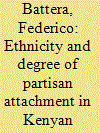

|
|
|
|
|
| Publication |
2013.
|
| Summary/Abstract |
The present analysis disaggregates election results and voter turnout according to the voters' ethnic background during a time span which covers three electoral processes (1997-2007) in Kenya. The two data combined produced an index which was called the 'degree of mobilization index'. Given that most of the Kenyan parties proved to be ethnic or made of ethnic alliances, voter turnout was found crucial in differentiating the degree of ethnic mobilization. Ethnicity alone, however, failed to explain these differences. The findings were likely linked to the past record of patronage for the five selected ethnic groups and the ability of such groups to provide a cohesive ethnic leadership.
|
|
|
|
|
|
|
|
|
|
|
|
|
|
|
|
| 5 |
ID:
187663
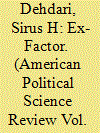

|
|
|
|
|
| Summary/Abstract |
The absence of a gendered analysis of the effect of marriage on voting is surprising given researchers’ cognizance of the heterogeneous effects of marriage on a range of other social outcomes. In this paper, we shed new light on spousal dependency by studying the gendered effect of marital disruption, in the form of divorce, on voter turnout. First, drawing on Swedish populationwide data, we use the differential timing of divorces in relation to general elections to generate more credible estimates of the causal effect of divorce on turnout. Second, although we find that both sexes are adversely affected by divorce, we show that the effect is much more pronounced for men. Specifically, the long-term effect is almost twice as large for men. Finally, we use these data to show that the gendered effect of divorce is mainly driven by asymmetrical spousal mobilization due to higher levels of turnout among women.
|
|
|
|
|
|
|
|
|
|
|
|
|
|
|
|
| 6 |
ID:
181197
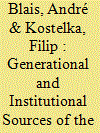

|
|
|
|
|
| Summary/Abstract |
Why has voter turnout declined in democracies all over the world? This article draws on findings from microlevel studies and theorizes two explanations: generational change and a rise in the number of elective institutions. The empirical section tests these hypotheses along with other explanations proposed in the literature—shifts in party/candidate competition, voting-age reform, weakening group mobilization, income inequality, and economic globalization. The authors conduct two analyses. The first analysis employs an original data set covering all post-1945 democratic national elections. The second studies individual-level data from the Comparative Study of Electoral Systems and British, Canadian, and US national election studies. The results strongly support the generational change and elective institutions hypotheses, which account for most of the decline in voter turnout. These findings have important implications for a better understanding of the current transformations of representative democracy and the challenges it faces.
|
|
|
|
|
|
|
|
|
|
|
|
|
|
|
|
| 7 |
ID:
159525


|
|
|
|
|
| Summary/Abstract |
Political scientists, analysts and journalists alike have long believed that the degree of satisfaction with the functioning of democracy determines voter turnout. We use survey data from 24 panel studies to demonstrate that this causal relationship is actually reversed: voter turnout affects satisfaction with democracy. We also show that this reversed relationship is conditioned by election type, electoral system, and election outcomes. These findings are important because: (1) They question conventional wisdom and a large body of scientific literature; (2) They invite a more nuanced approach towards the study of the relationship between evaluations of regime performance and political participation; and (3) They emphasize the vital role of elections in shaping citizens’ perception of the democratic process.
|
|
|
|
|
|
|
|
|
|
|
|
|
|
|
|
| 8 |
ID:
192842
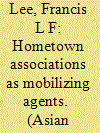

|
|
|
|
|
| Summary/Abstract |
Scholars have noted that the Chinese government has been grooming a range of grass-roots social organizations in Hong Kong since the handover. Hometown associations (HTAs), in particular, are seen as an important cultural nexus capable of integrating patron–client relationships based on material benefits with social relationships rooted in common culture and identity. Few studies, however, have documented the mobilizing power of HTAs quantitatively. This article examines the mobilizing power of HTAs in the 2021 Legislative Council elections, where the state attempted to promote voter participation to protect the legitimacy of the “reformed” electoral system. Analysis at the level of District Council constituencies shows that the presence of HTAs was indeed related to higher voter turnout. I also test whether the impact of HTAs was conditioned by population characteristics. General implications of the findings are discussed.
|
|
|
|
|
|
|
|
|
|
|
|
|
|
|
|
| 9 |
ID:
117659
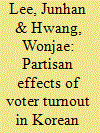

|
|
|
|
|
| Publication |
2012.
|
| Summary/Abstract |
This paper explores the partisan effects of voter turnout in 12 Korean elections. We argue theoretically and show empirically that hypothetical increases in turnout generate benefits for left-wing or minor parties, rather than right-wing or major parties. Complete voter turnout may have changed the actual electoral results in close elections.
|
|
|
|
|
|
|
|
|
|
|
|
|
|
|
|
| 10 |
ID:
175110
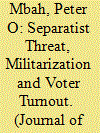

|
|
|
|
|
| Summary/Abstract |
Using the qual-dominant mixed methods approach, this study analysed the impact of the separatist threat and the militarization of elections on voter turnout during the 2017 governorship election in Anambra State, Nigeria. Findings indicate that perceived and real marginalization of the Igbo in Nigeria’s state-building is largely driving the neo-Biafra separatist threat to boycott elections in Anambra State. This does not only account for the state militarization of elections in order to guarantee security; it also inadvertently engendered fear among citizens, undermined voter turnout and exacerbated political exclusion. This study concludes that inclusive political development presents an opportunity for de-escalation of separatist threats, demilitarization of elections and enhancement of voter turnout in Nigeria.
|
|
|
|
|
|
|
|
|
|
|
|
|
|
|
|
| 11 |
ID:
142292
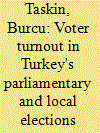

|
|
|
|
|
| Summary/Abstract |
This study evaluates the influence of party competitiveness, number of parties and intervention of non-elected actors, as well as socio-economic and institutional factors, with respect to voter turnout in Turkish parliamentary and local elections. While statistical results contradicted expectations, the application of compulsory voting proved to be the single most important determinant for an increase in voter turnout, whereas electoral type and electoral system difference become insignificant for electoral participation motivation. The first democratic elections following a military intervention generally shows a significant jump in voter turnout, but it also causes a decrease in the number of parties and diminishes party competition for the following electoral terms. Large numbers of registered voters and high voter turnout motivate parties to compete in the elections. Nevertheless, lack of party competition and a 10 percent electoral threshold enable only a few parties to take a piece of this enormous electoral pie.
|
|
|
|
|
|
|
|
|
|
|
|
|
|
|
|
| 12 |
ID:
122901
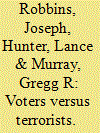

|
|
|
|
|
| Publication |
2013.
|
| Summary/Abstract |
Scholars and policymakers commonly assume terrorism is intended to affect a broader audience beyond the physically targeted victims. Informed by scholarship regarding the effects of heuristics and emotion on political cognition and behavior, we evaluate the impact of terrorism on the broader audience of the electorate as manifested by voter turnout. We hypothesize that increased terrorism is associated with increased voter turnout. In particular, we invoke the Affective Intelligence model and its related findings that emotion plays a key role in individuals' political cognition and behavior. Following this perspective, we argue that terrorist attacks are threatening and novel political events that induce anxiety in the electorate, which, in turn, leads individuals to scrutinize the political environment more closely and to ascribe greater salience to proximate political events. As a result of this increased concern with the political environment and increased salience of upcoming elections, we expect voter turnout to increase. While conventional explanations of turnout are important, they do not capture the effect of emotions despite other well-known relationships, such as attitudinal responses to international political crises (e.g. the rally-around-the-flag effect). Our cross-national analyses, which include 51 democracies and use two geographically and definitionally distinct datasets, indicate that the positive relationship between terrorism and turnout is non-trivial and robust.
|
|
|
|
|
|
|
|
|
|
|
|
|
|
|
|
|
|
|
|
|